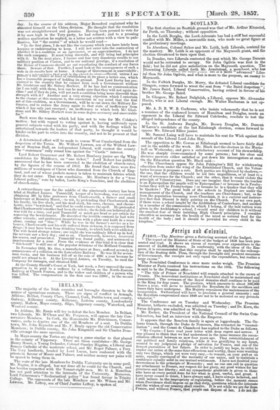SCOTLAND.
The first election on Scottish ground was that of Mr. Arthur Kinnaird, for Perth, on Thursday ; without opposition. In the Leith Burghs, the Lord-Advocate has had a stiff but successful conflict with Mr. Miller, a mercantile man, who made no great figure at the preliminary meetings. In Aberdeen, Colonel Sykes and Mr. Leith, 'both Liberals, contend for the mastery. Mr. Leith is an opponent of the Maynooth grant, and the election threatened to turn upon that.
In Dundee, two Liberals contested the seat which Mr. George Duncan would not be entreated to occupy. Sir John Ogilvie was first in the field ; but be_th■lnot.a_g:i,ve satisfaction on aMmaynoreoothadqvueanseedtion."The Dissenting Liberals called forth Mr. Armitstead. a reliant, who has
isal than Sir John Ogilvie, and what is more to the purpose, an enemy to Maynooth.
In the Falkirk Burghs, Mr. Merry, the defeated Liberal candidate for Glasgow, comes forward to wrest the seat from "the Baird despotism" Mr. James Baird, Liberal Conservative, having retired in favour of his brother Mr. George Baird.
In Glasgow, Mr. Robert Dalgleish, a Liberal, opposes Mr. Alexander Hastie, who is not Liberal enough. Mr. Walter Buchanan is not opposed.
Mr. A. D. R. W. B. Cochrane, who insists vehemently that he is not a nominee of the coalesced houses of Hamilton and Douglas, meets an opponent in the Liberal Sir Edward Colebroke, resolute to test the alleged independence of the county.
In the St. Andrews Burghs, Mr. Brown Douglas, Mr. Duncan M`Laren's candidate at the last Edinburgh election, comes forward to oppose Mr. Edward Ellice junior.
Mr. Samuel Laing will have to maintain his seat for Wick against the assault of the Liberal Lord John Hay.
The opposition to Mr. Cowan at Edinburgh seemed to have fairly died out in the middle of the week. Mr. Black met the electors in the Music hall on Wednesday, and gave a satisfactory account of his stewardship. He was sharply cross-examined by some persona; but his clear and decisive answers either satisfied or put down his interrogators at once. On the Education question Mr. Black said " The Churchmen oppose Sir John Pakington'a Bill for withdrawing education from under the wing of the Established Church, and the Volun taries because it proposes a rate. Both parties are frightened by shadows,— the one, that the children would be led into ungalliness, or at least to a want of reverence for the Church ; and the other, that it would violate the principle of Voluntaryism. Does any one imagine that because the teacher is an Episcopalian the pupils will be Episcopalian ? or because he is Presbyterian they will be Presbyterians ? or because he is a Quaker that they will be Quakers ? The great bulk of the schools in England are under the management of the Church, and the teachers are Churchmen ; but, so far from the population becoming more Churchish, it is a curious and instruc tive fact that Dissent is daily gaining on the Church. For my own part, if there were a school taught by the Archbishop of Canterbury, and another by a member of the communion to which I belong, if the best tuition were raven in the Archbishop's school, I .would send my children to it without the smallest fear of their imbibing High Church principles. I consider education as necessary for the health of the mind as natural food for the health of the body ; and it should be provided for every child in the kingdom."


























 Previous page
Previous page